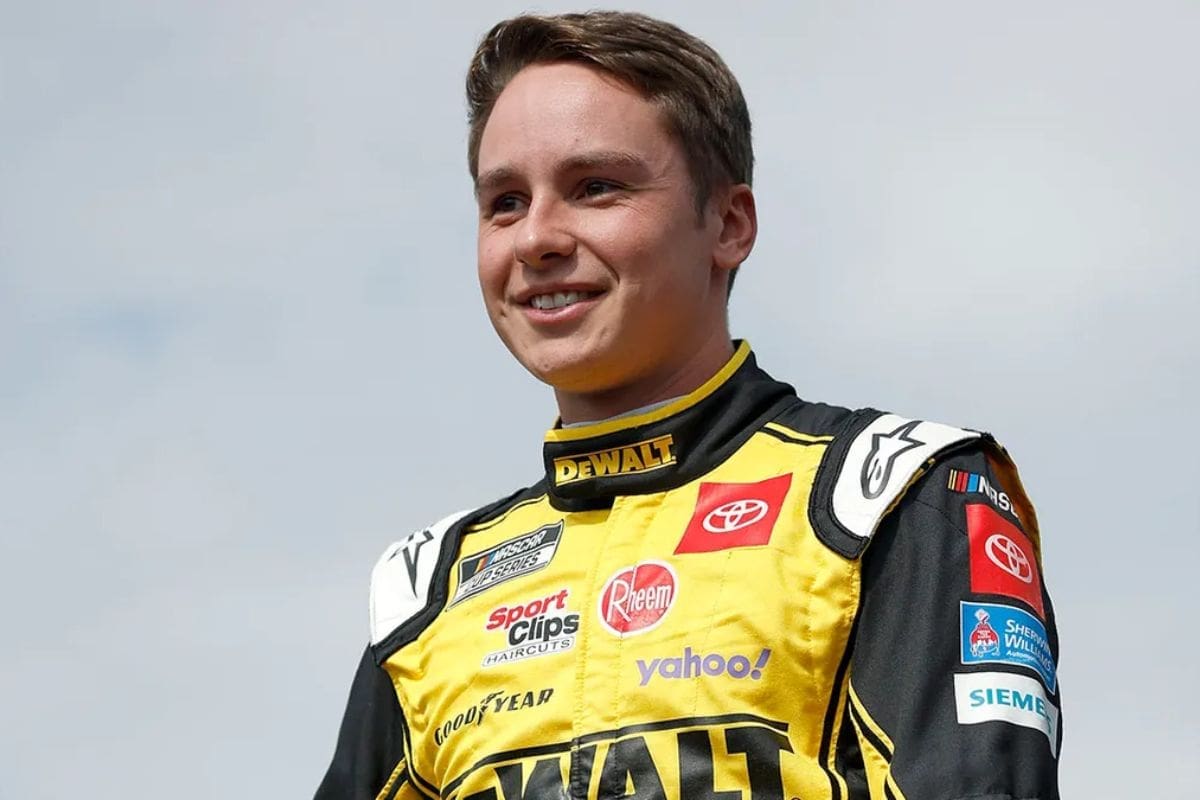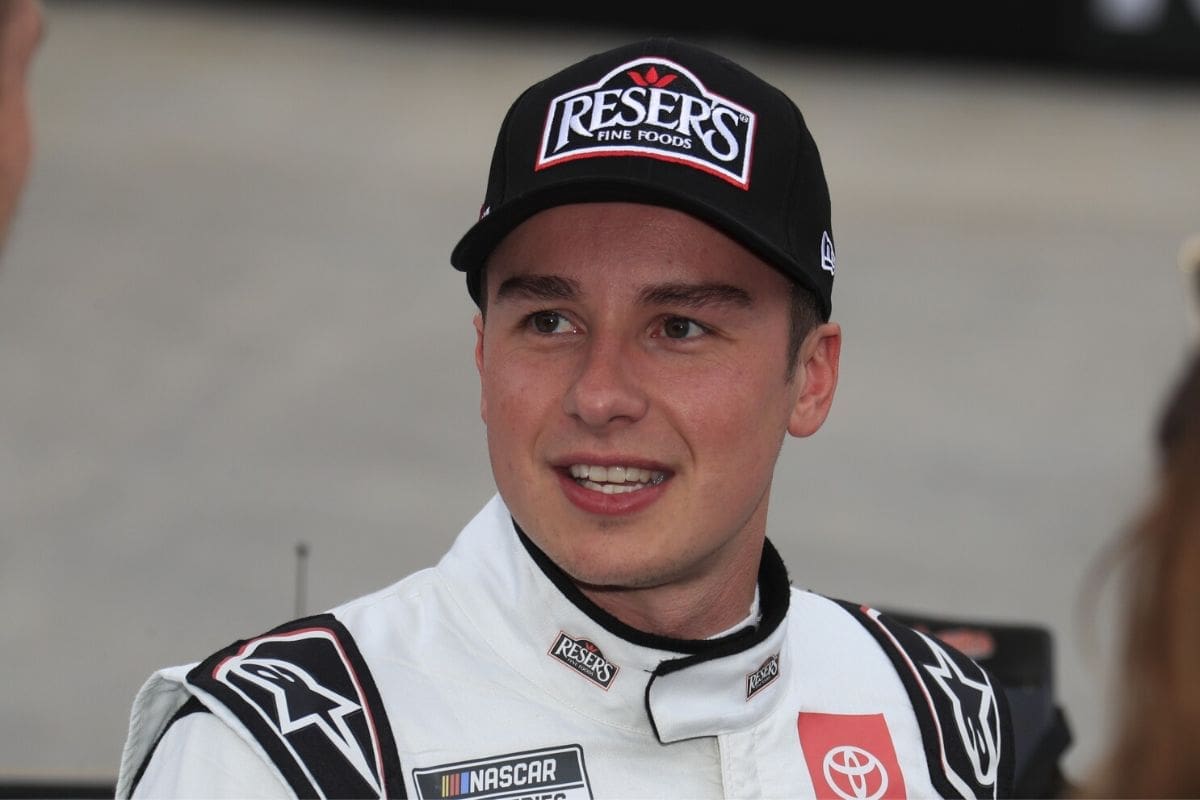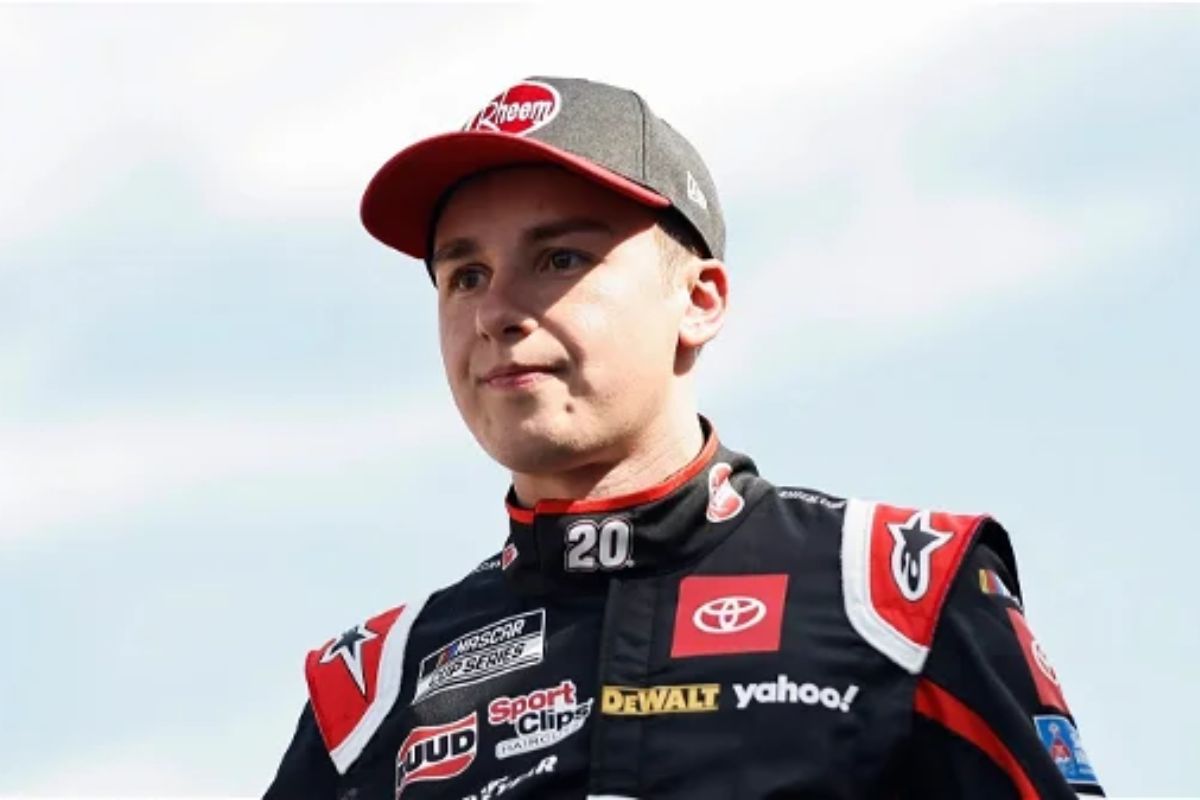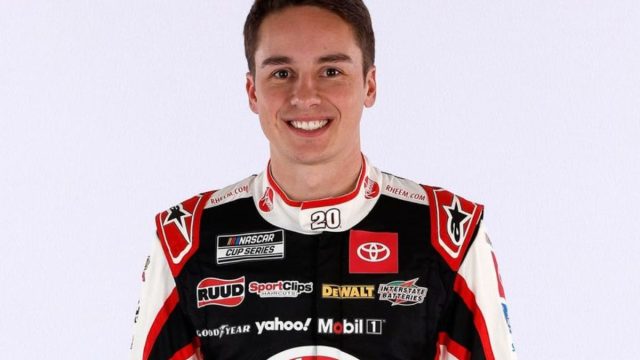Christopher Bell Least Favorite Tracks Revealed: Christopher Bell, a promising talent in the NASCAR series, has expressed a notable aversion to superspeedways. These tracks, known for their high-speed racing and close quarters, amplify the consequences of even minor errors, making them particularly challenging. Bell’s perspective illuminates the balance between skill and the unpredictable dynamic of racing at such venues. Despite this, his recent triumph at Phoenix and positive outlook for Richmond, backed by Joe Gibbs Racing’s track record, showcase his adeptness and strategic approach to overcoming adversities. Exploring Bell’s career further reveals an athlete skilled at maneuvering the complexities of professional racing.
Key Takeaways
- Christopher Bell has expressed a distinct dislike for superspeedways, citing their unpredictable nature.
- He highlights the magnified consequences of errors on superspeedways, making races thrilling.
- Bell’s trepidation towards superspeedways stems from their ability to turn races into unpredictable events.
- Despite his success, Bell’s discomfort with superspeedways reveals his precise understanding of NASCAR’s demands.
- His preference for tracks like Richmond Raceway, where he has a positive outlook, contrasts with his feelings towards superspeedways.
Christopher Bell’s NASCAR Season Outlook
As Christopher Bell gears up for the eighth weekend of the NASCAR Cup Series, his recent triumph at Phoenix Raceway positions him as a formidable contender in this fiercely competitive season. Bell, driving for Joe Gibbs Racing, brings a clear understanding of his journey through the series, reflecting on his performance with a blend of humility and strategic foresight. His victory at Phoenix not only highlights his driving prowess but also signals a significant momentum shift as the series progresses.
With the 75th annual Cook Out 400 at Martinsville Speedway on the horizon, Bell’s insights into his season thus far reveal a driver deeply analytical about his performances across different circuits. This victory, symbolic of his adaptability and skill, has not only strengthened his confidence but also sharpened his focus on the challenges ahead. In a sport where every fraction of a second counts, Bell’s reflection on his win and his anticipation of future races emphasize his commitment to excellence and continuous improvement.
Bell’s preferences regarding track types, gleaned from his experiences this season, further illustrate his strategic approach to racing. While his recent win at Phoenix has been a highlight, it is his broader perspective on the season that offers a glimpse into his mindset as a professional driver. As he prepares for Martinsville, Bell’s outlook remains grounded yet optimistic, showcasing his readiness to tackle the diverse challenges that each race presents. In a season marked by intense competition, Bell’s journey is a confirmation of the perseverance and strategic acumen required to excel in NASCAR’s premier series.

Bell’s Dislike for Superspeedways
Exploring the domain of NASCAR’s most challenging tracks, Christopher Bell openly voices his trepidation towards superspeedways such as Daytona and Talladega, highlighting their unpredictable nature and the heightened risk of racing on these colossal circuits. Bell’s perspective sheds light on the inherent complexities and the stark unpredictability that characterize these iconic tracks. The vast expanses of Daytona and Talladega, renowned for their high speeds and pack racing, magnify the consequences of even the smallest errors, making every lap a high-stakes endeavor.
Bell’s apprehension towards superspeedways emphasizes a broader sentiment that resonates with many drivers in the NASCAR series. The unpredictable dynamics at these tracks can turn a race from a strategic battle to a game of chance, where a driver’s fate can be determined by the actions of others, often beyond their control. This unpredictability not only challenges a driver’s skill but also tests their mental fortitude, as they navigate through the relentless draft and the ever-present threat of ‘The Big One,’ a massive, multi-car accident characteristic of superspeedway racing.
Historically, Joe Gibbs Racing has a pretty stellar track record at Richmond. With Christopher Bell already having one win notched up this year, the No. 20 team is gunning to add to the success Sunday evening in Virginia. https://t.co/6vKFxlifVE pic.twitter.com/pvNaYCkDnG
— RACER (@RACERmag) March 30, 2024
Despite his reservations, Bell acknowledges the crucial role that superspeedways play in the NASCAR calendar, presenting a unique challenge that diversifies the season’s landscape. His candid reflection on the difficulties posed by Daytona and Talladega reveals a understanding of the sport’s demands, highlighting the blend of skill, strategy, and sometimes, sheer luck required to succeed in NASCAR’s most unpredictable arenas.
“Honestly, Daytona, Talladega, Atlanta, the superspeedway stuff is probably my least favorite style of racing that we have in the NASCAR calendar…one mistake from anybody can end up taking out several other competitors or the majority of the field, for that matter.” ( Bell )
Confidence Ahead of Richmond Raceway
While Christopher Bell expresses concerns about the unpredictability of superspeedways, his outlook shifts positively when discussing the upcoming race at Richmond Raceway, buoyed by Joe Gibbs Racing’s impressive history at the venue. The team’s dominance is undeniable, with a record of winning 10 out of the last 19 races at the track. This statistic not only highlights the team’s proficiency but also emphasizes a consistent performance level that few can match in the NASCAR series.
Denny Hamlin’s recent triumph at the Toyota Owners 400 further solidifies JGR’s stronghold at Richmond, showcasing their ability to adapt and thrive under varying conditions. This victory is not just a reflection of the driver’s skill but also of the team’s meticulous preparation and strategy, which have been crucial in securing wins at the 0.75-mile oval.
Bell’s confidence ahead of the Richmond race is well-founded, rooted in both JGR’s historical success and the current momentum following Hamlin’s victory. He attributes his optimism to the team’s track record and the fast cars they consistently bring to the competition. This sentiment reflects a deeper understanding that success in NASCAR often hinges on the synergy between driver and vehicle, a balance that Joe Gibbs Racing seems to have mastered, particularly at Richmond Raceway.

JGR’s Performance at Richmond
Joe Gibbs Racing’s impressive performance at Richmond Raceway, spearheaded by Denny Hamlin’s win and Martin Truex Jr.’s solid fourth-place finish, highlights the team’s lasting competitiveness and expertise on this demanding track. Despite the inherent challenges that Richmond presents, JGR’s ability to consistently place multiple cars in top positions emphasizes its strategic acumen and the high caliber of their drivers and support teams. This performance is not just a reflection of their preparation for this specific race but also an indication of their broader capabilities within the NASCAR series.
To understand the significance of JGR’s performance at Richmond, consider the following key points:
- Strategic Mastery: The team’s success is partially attributed to their strategic planning and in-race adjustments. This level of adaptability is essential on a track like Richmond, where race dynamics can shift dramatically.
- Driver Expertise: Denny Hamlin’s victory and Martin Truex Jr.’s strong finish are indicative of the drivers’ deep understanding of the track and their ability to navigate its complexities under pressure.
- Team Synergy: The collective effort of the pit crew, engineers, and support staff plays a crucial role in executing the race strategy flawlessly. Their coordination guarantees the drivers can perform at their best.
JGR’s performance at Richmond is a compelling illustration of what makes them a formidable force in NASCAR. Their ability to harness strategic insight, driver talent, and team cohesion—especially on challenging tracks—sets a high standard for excellence and competitiveness in the sport.
Bell’s Appreciation for JGR’s Support
Building on Joe Gibbs Racing’s remarkable performance at Richmond Raceway, Christopher Bell has expressed deep appreciation for the unwavering support he receives from the team, especially at this venue. Bell’s sentiments highlight a symbiotic relationship between driver and team that is crucial to achieving success in the highly competitive environment of NASCAR racing. His recognition of the team’s support and the resulting confidence it instills in him as he prepares to compete at one of JGR’s top racetracks is not just a reflection of personal gratitude but an insight into the dynamics of team sports, particularly motorsports.
Analyzing Bell’s comments, it becomes clear that the foundation of his trust and enthusiasm for competing at Richmond lies in the meticulous preparation and strategic expertise of Joe Gibbs Racing. This level of support enables Bell to approach races with a heightened sense of confidence, knowing that every variable that can be controlled by the team has been optimized for performance. Such a complete support system is essential in a sport where the difference between winning and losing can be fractions of a second and where the mental state of the driver can greatly impact the race outcome.
This relationship between Bell and Joe Gibbs Racing exemplifies the essence of teamwork in motorsports, where success is often attributed to the synergy between the driver’s skill and the team’s ability to provide a competitive machine and strategic support. Bell’s gratitude for JGR’s support, particularly at Richmond Raceway, is a confirmation of the critical role that a cohesive team plays in the intricacies of NASCAR racing.

News in Brief
The analysis of Christopher Bell’s preferences and performance provides significant insights into the dynamics of NASCAR racing. Bell’s aversion to superspeedways juxtaposed with his confidence at Richmond Raceway highlights the intricate relationship between a driver’s affinity for specific tracks and their overall success.
Moreover, the support from Joe Gibbs Racing (JGR) emerges as a crucial factor in enhancing Bell’s performance, illustrating the essential role of team backing in achieving excellence in motorsports.
Our Reader’s Queries
Q: How many races did Christopher Bell win?
A: With seven career wins in the Cup series, Christopher Bell secured his most recent victory in March 2024 at Phoenix Raceway. His inaugural win came in 2021 at the Daytona International Speedway Road Course. Additionally, his triumph at Martinsville Speedway in October 2022 earned him his first Championship 4 appearance.
Q: What happened to Christopher Bell at Phoenix Raceway?
A: Bell and JGR headed to Phoenix Raceway in November with hopes of contending for the Cup Series title as part of the championship four. However, their aspirations were dashed when Bell’s car suffered an early breakdown, leaving the team disappointed.
Q: Is NASCAR driver Christopher Bell married?
A:NASCAR driver Christopher Bell resides with his wife Morgan Kemenah Bell. They tied the knot in 2020 following a two-year engagement.
Also Read: Christopher Bell Praises NASCAR: Wet Weather Victory Lap!
